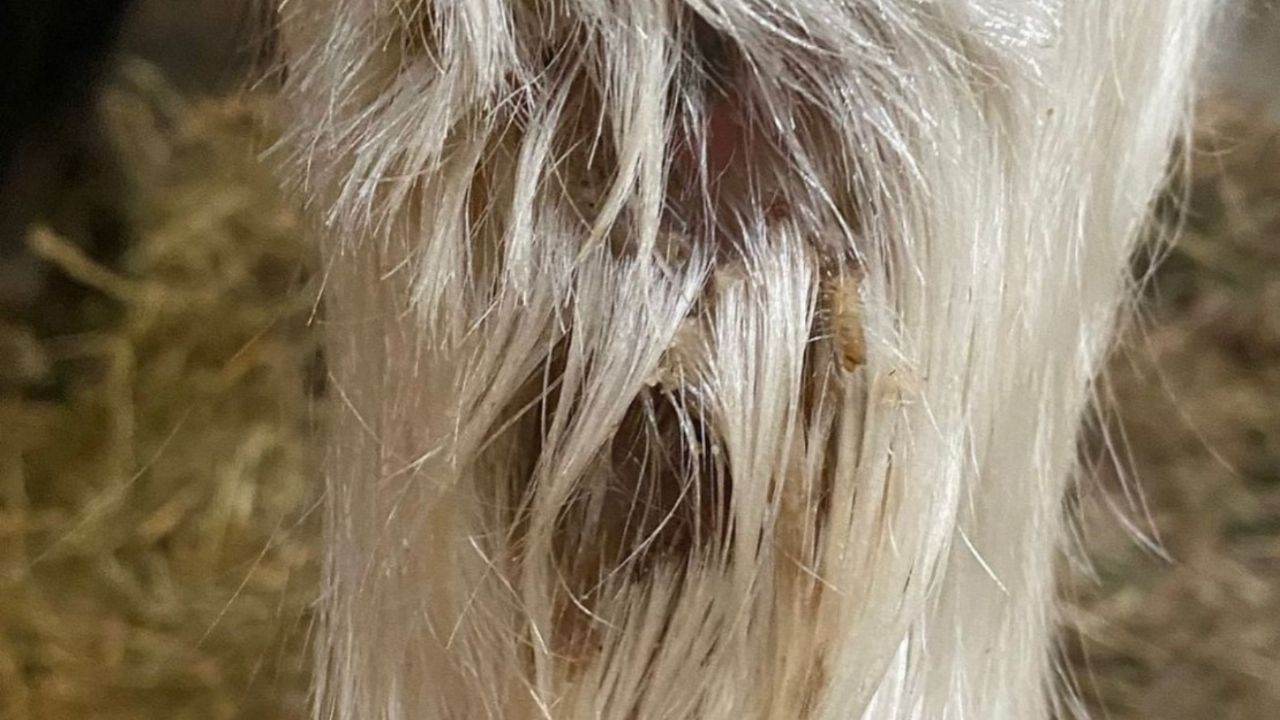Why do we recommend feeding horses from ground level?
How does the horse's jaw work? What happens if horses eat above ground level? Read the article to learn more...

Mallenders and Sallenders is an unfortunate and incurable skin condition causing scaling, crusting and scabbing on the legs. Specifically, sallenders occurs at the back of the knee on the front leg whilst mallenders affects the front of the hock on the hind leg. A more technical term for the basis of the condition is hyperkeratosis which is the over-production of keratin: a vital component of skin, hair and hooves.
In feathered breeds, such as cobs and draughts, this excessive keratin production can become problematic and cause thickening of the skin. In the creases around the highly mobile joints of the lower limb, thickened skin can create excess pressure and may rub, leading to cracks that can become sore and infected. This will likely be uncomfortable for your horse and may cause swelling of the lower limb, localised hair loss or even lead to lameness. Historically feathery horses stamping their feet were perhaps wrongly assumed to simply be suffering from feather mites but we are much more aware the problems excess keratin can cause.
Despite its relatively high prevalence in horses with feather, it has rarely, if ever, been the subject of scientific research so most management suggestions are based on anecdotal findings. This means what works for one horse may not work for all. It can be a difficult trial and error process to discover what works best for your own horse.
What we do know is that the area should be kept dry to a certain extent, avoiding warm and damp conditions in which bacteria can thrive. Very dry skin is at risk of splitting and bleeding so the area should be kept moisturised but not wet. Dry scabs, in the absence of open sores, can be gently brushed out. Keeping feathers well brushed and free from matts will help improve airflow to these areas to aid healing. Some people will clip the feathers off altogether but those used for showing will want to keep the lush hair they were bred to have.
Perfumed soaps and lotions should be completely avoided as should chemical-based products that are more likely to irritate already sensitive skin. There are some specific mallenders and sallenders creams on the market or you may be advised to use an anti-bacterial or anti-fungal cream to help minimise infection.
Management of the external condition is a major factor, diet can also play a role. It is suggested to avoid supplementary biotin and carrots as both of these are thought to encourage the production of keratin, which is already happening in abundance. Molasses and starchy feeds are often associated with itchiness so perhaps best avoided and whilst some horses experience a flare up when feeding lucerne, others swear by its use - demonstrating that there isn't a 'one size fits all' solution.
When feeding a horse prone to Mallenders and Sallenders we recommend feeding a simple yet supportive diet. One of our newest feeds in the range is MalleMash. This low calorie 'one bag' feed is in the form of a high fibre mash that soaks instantly. It is rich in omega 3 and naturally occurring vitamins and minerals to support those with Mallenders, Sallenders, CPL (Chronic Progressive Lymphedema) and dry itchy skin. Other suitable options from the Simple System range include our low sugar Timothy grass feeds, Blue Bag Grass Pellets, HayCare and Timothy Chop. For horses who are young and growing, hardworking horses or poor doers, Sainfoin Pellets can be used to increase calorie density. A high inclusion of linseed is also thought to be beneficial to support the skin and coat. There is already a high inclusion of linseed in MalleMash, but if you are feeding our other products you may wish to add some Instant Linseed to the diet, or consider adding Total Eclipse as a comprehensive forage balancer - which works well for many horses.
Article by Ellen Lincoln BSc (Hons), Feed Line advisor at Simple System Horse Feeds
If you'd like to request a free Feed Plan for a horse who has Mallenders and Sallenders our expert team will be happy to help. Simply complete our online form or call 01728 604 008.
How does the horse's jaw work? What happens if horses eat above ground level? Read the article to learn more...
We're thrilled to be adding an exiting new event to the calendar for 2026!
Horses’ teeth change throughout their lives - they are continually growing and continually wearing, as they chew and grind their grazing and forage.